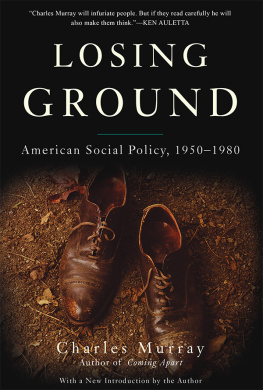American Social Welfare Policy
Westview Special Studies
The concept of Westview Special Studies is a response to the continuing crisis in academic and informational publishing. Library budgets are being diverted from the purchase of books and used for data banks, computers, micromedia, and other methods of information retrieval. Interlibrary loan structures further reduce the edition sizes required to satisfy the needs of the scholarly community. Economic pressures on university presses and the few private scholarly publishing companies have greatly limited the capacity of the industry to properly serve the academic and research communities. As a result, many manuscripts dealing with important subjects, often representing the highest level of scholarship, are no longer economically viable publishing projectsor, if accepted for publication, are typically subject to lead times ranging from one to three years.
Westview Special Studies are our practical solution to the problem. As always, the selection criteria include the importance of the subject, the works contribution to scholarship, and its insight, originality of thought, and excellence of exposition. We accept manuscripts in camera-ready form, typed, set, or word processed according to specifications laid out in our comprehensive manual, which contains straightforward instructions and sample pages. The responsibility for editing and proofreading lies with the author or sponsoring institution, but our editorial staff is always available to answer questions and provide guidance.
The result is a book printed on acid-free paper and bound in sturdy library-quality soft covers. We manufacture these books ourselves using equipment that does not require a lengthy make-ready process and that allows us to publish first editions of 300 to 1000 copies and to reprint even smaller quantities as needed. Thus, we can produce Special Studies quickly and can keep even very specialized books in print as long as there is a demand for them.
About the Book and Author
Social welfare activities stand at the heart of the modern democratic state as they absorb ever-increasing budget allocations and stimulate debate over the proper role of government. This study analyzes the development of social welfare policy in modern America, beginning with a critical assessment of the dominant progressive and social control theoretical perspectives. Dr. Rochefort then discusses an alternative approach focusing on the link between changing social attitudes and beliefs and the content of public policy. Case studies of seminal legislation in the areas of mental illness, old age, and welfare illustrate this approach by tracing how important shifts in national policy have grown out of changing perceptionsamong policymakers, social scientists, professional groups, and the general citizenryof the nature and causes of different kinds of social welfare problems. A concluding chapter considers a number of related theoretical issues, including the role of public opinion within the policymaking process and an identification of the factors that lead to innovation in the formulation of social welfare policies. A postscript analyzes the major social welfare initiatives of the Reagan administration.
David A. Rochefort is assistant professor in the political science department at Northeastern University. He teaches courses in public policy and research methods to undergraduates and students in the Master of Public Administration program. He has also worked as a health planning specialist and policy consultant for government agencies in the states of Rhode Island and Massachusetts.
First published 1986 by Westview Press
Published 2018 by Routledge
52 Vanderbilt Avenue, New York, NY 10017
2 Park Square, Milton Park, Abingdon, Oxon OX14 4RN
Routledge is an imprint of the Taylor & Francis Group, an informa business
Copyright 1986 by Taylor & Francis
All rights reserved. No part of this book may be reprinted or reproduced or utilised in any form or by any electronic, mechanical, or other means, now known or hereafter invented, including photocopying and recording, or in any information storage or retrieval system, without permission in writing from the publishers.
Notice:
Product or corporate names may be trademarks or registered trademarks, and are used only for identification and explanation without intent to infringe.
Library of Congress Cataloging in Publication Data
Rochefort, David A.
American social welfare policy.
Bibliography: p.
(Westview special studies in public policy and public systems management)
Includes index.
1. Public welfareUnited States. 2. United States
Social policy. I. Title.
HV95.R57 1985 361.610973 85-3323
ISBN 0-8133-0243-9
ISBN 13: 978-0-367-00672-3 (hbk)
To Eileen
Contents
Tables and Figures
Like many of the social welfare policies that are analyzed within, this book had a somewhat lengthy period of incubation. It began as a doctoral thesis at Brown University some six years ago and, in the time since the completion of that project, it has undergone substantial reformulation, amplification, and revision. I welcome this opportunity to thank the many teachers, friends, and colleagues who provided moral and intellectual support throughout the different stages of this process.
My academic advisers at Brown, Michael Yedidia (now at New York University), Roger Cobb, and James T. Patterson, provided valuable guidance in the original design of this study and in its preparation as a doctoral dissertation. The latter two scholars continued to serve as useful sources of critical advice as I labored to transform my dissertation into a book. Whatever narrative grace and sensitivity to historical materials this work may possess owes much to my exposure to James T. Pattersons high standards in these areas. And no one more fully influenced the theoretical orientation of this book than Roger Cobb. Those readers who are familiar with this scholars work on agenda-building, problem-definition, and symbolic politics will not fail to see how his ideas have helped shape my own thinking.
Other individuals who read selected chapters of this manuscript and offered helpful comments were Phil Brown, Charles Elder, Paul Peretz, and Harry Sterling. In the course of researching and writing this study, I often benefited from conversations with friends and colleagues that enabled me to clarify my own thinking on certain troublesome aspects of content and organization. For their interest and willingness to listen, I want to thank, in particular, Eugene Archese, Phyllis Glick, Bruce Logan, William Miles, Paul Pezza, Jeffrey Stevens, Harry Wessel, and Mark Yessian. Thanks also go to my graduate assistant, Timothy J. McNulty.
Cecile Watters provided expert editorial assistance and indexed the book. Geneva Peach did the typesetting and her commitment to quality is evident throughout. Both individuals were thoroughly reliable production consultants and their personal interest in the progress of my manuscript was much appreciated.
I hope that the publication of this book will give some pleasure to my parents, who have always encouraged me in my academic pursuits. I know that the high value I place on intellectual curiosity and the world of learning originates in large part with them.
Finally, it is to my wife, Eileen, that I dedicate this book. To enumerate the several ways that she aided in the completion of this work would not only be exceedingly long but must fail to do justice to her contribution by implying that it somehow can be accurately measured. In a sense that only she can appreciate, Eileen lived this project with me, and I wonder where I would have found the necessary patience and commitment without her.












